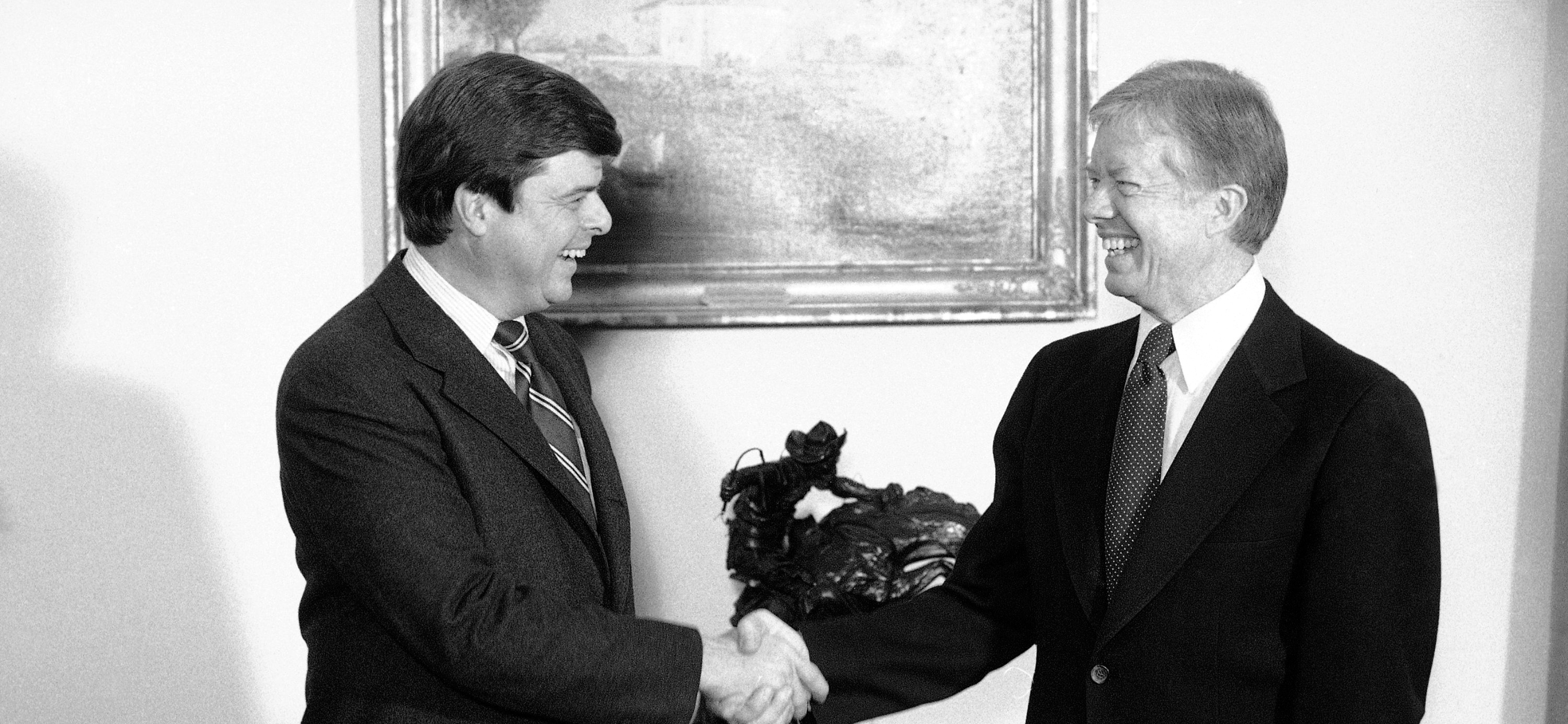Stay ahead of the curve as a political insider with deep policy analysis, daily briefings and policy-shaping tools.
Request a DemoFormer U.S. Sen. Jim Sasser of Tennessee dies at 87

Sen. Jim Sasser, D-Tenn., left, shakes hands with President Jimmy Carter in the Oval Office at the White House in Washington on Feb. 11, 1980 after telling the president that he will support his re-election for office and will campaign for him in Tennessee. (Credit: AP Photo/Mark Wilson)
- Sasser defeated Republican Bill Brock in 1976 but lost to Bill Frist in 1994
- He was poised to become the Senate Democratic leader when he lost his re-election bid
- President Bill Clinton later named Sasser ambassador to China
Jim Sasser, a former 18-year U.S. senator from Tennessee who went on to become the nation’s ambassador to China, has died. He was 87.
The former Democratic politician’s son, Gray Sasser, confirmed his father had passed away in Chapel Hill, North Carolina, on Tuesday evening.
Sasser, a Memphis native and long-time active in Democratic circles, managed Albert Gore Sr.’s unsuccessful 1970 reelection campaign. A Vanderbilt law school graduate, Sasser won back the seat in 1976 from Republican U.S. Sen. Bill Brock of Lookout Mountain.
Sasser’s win came after Brock, a millionaire businessman whose family owned a candy company, came under pressure to reveal his finances. Brock acknowledged he had paid $2,026 on an income of $51,670, a rate of less than 4% at a time when others earning that amount would have to cut the IRS a check for as much as 62% of their income.
Sasser and gleeful Democrats seized on the tax issue and began hammering away at Brock. Hot pink buttons quickly sprang up with the slogan, “I Paid More Taxes Than Brock.” Organized labor jumped in with a news conference where leaders compared Brock’s taxes with that of auto and steel workers. Sasser won the post-Watergate era contest and went on to serve three terms, from 1977 to 1995. He rose to become chairman of the Senate Budget Committee.
Sasser lost his 1994 reelection bid to Nashville heart-transplant surgeon and Republican Bill Frist. During the campaign, the Frist campaign’s rallying cry was: “18 years are long enough.”
While the 1994 race was underway, Sasser entered the race to replace Maine’s George Mitchell as Senate majority leader. Sasser had earned respect and chits among his Democratic colleagues in his position as budget chair. But while Sasser was enjoying his new national prominence, Republican candidates in Tennessee attacked his record in passing President Bill Clinton’s budget and raising taxes. While squabbling among themselves on an array of issues, the “six pack” of GOP candidates were unified in blasting Sasser as entrenched and out of touch.
“Jim Sasser is a bleeding heart liberal, and who better to take him out than a heart transplant surgeon,” Frist said early in the race.
As Republicans painted him as an old fashioned liberal, Sasser used his first TV ads of the campaign to stake out a favorite conservative issue — school prayer. The spot said Sasser repeatedly voted in favor of the idea. The turn toward conservative issues left Republicans unimpressed.
“Why, it’s like he’s a born-again Rush Limbaugh,” Tennessee Conservative Union President John Davies joked at the time.
As he saw his lead in the race slipping away, Sasser attacked Frist for his failure to vote until age 36 and for his family wealth. But in the end, Frist pulled off one of the biggest upsets in the country, a political neophyte defeating one of the Senate’s top leaders.
Several planets aligned to give Frist the victory. He benefited from a huge Republican wave, and his consultants gave him the exact message to maximize his boost from it. Frist’s campaign was run by Georgia political mastermind Tom Perdue and fundraising efforts were supplemented by $3.2 million of the candidate’s own money — a large amount at the time.
Sasser’s campaign was not as smooth. He was hurt by having to stay in Washington while Frist hammered him at home. And Sasser’s messages that was really a conservative and that having a four-term incumbent would be good for Tennessee didn’t work.
Despite his three six-year terms in office, Sasser was only 58 when he left the Senate. President Bill Clinton later named ambassador to China in 1995. Admiral Joseph W. Prueher, a Nashville native, succeeded Sasser as U.S. ambassador to China in 1999.
Jim Sasser had first become active in the Democratic Party after working on Estes Kefauver’s 1960 Senate campaign. He served as chairman of the state party from 1973 to 1976.
Sasser is survived by his wife, Mary. His son, Gray, followed in his footsteps by serving a term as state Democratic Party chair from 2007 to 2009.
“It is impossible to put into words how much Jim Sasser meant to me and my family,” said former Vice President Al Gore. “He was a man of outstanding character and conviction, a great United States senator and later an outstanding diplomat in the truest sense of the word. Throughout his career in public service, Jim represented the best of Tennessee and the best of America.”
Know the most important news affecting Tennessee
Get our free weekly newsletter that covers government, policy and politics that impact your everyday life—in 5 minutes or less.
Feds allege Russians funneled $10M through conservative outlet in Tennessee
After being dropped by distributors in 2022, the television network formerly known as Russia Today covertly funded a conservative content creation company in Tennessee to spread misinformation, according to a federal indictment unsealed Wednesday. RT employees Kostiantyn Kalashnikov and Elena Afanasyeva were charged with conspiracy to violate the Foreign Agents Registration Act and to commit …
Republicans threaten $78M in state funding if Memphis ‘goes rogue’ on gun control
House Speaker Cameron Sexton and Lt. Gov. Randy McNally, threatening financial retribution for Memphis if the city goes through with ballot measures on guns in November. Secretary of State Tre Hargett followed up the missive by announcing his office would not approve the ballot unless the questions are removed. The referendums would ask voters if …
FBI seized Andy Ogles’ phone the day after he won GOP primary
Federal agents executed a search warrant on controversial U.S. Rep. Andy Ogles’ phone the day after he won the Republican nomination to serve another term in the 5th Congressional District seat. “It has been widely reported for months that my campaign made mistakes in our initial financial filings,” Ogles said in a statement Tuesday. “We …
Public records bill dropped in House as retribution for failure of unrelated measure
In the waning days of Tennessee lawmakers’ annual session last week, Senate Judiciary Committee Chair Todd Gardenhire got a bill passed unanimously in the upper chamber to prevent non-governmental third parties from intervening in public record lawsuits. But the sponsor of the companion bill decided against taking up the measure on the last day the …



